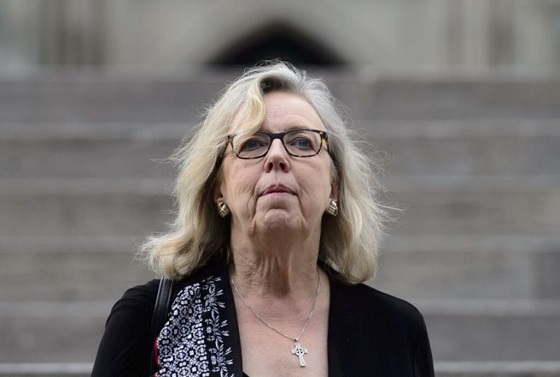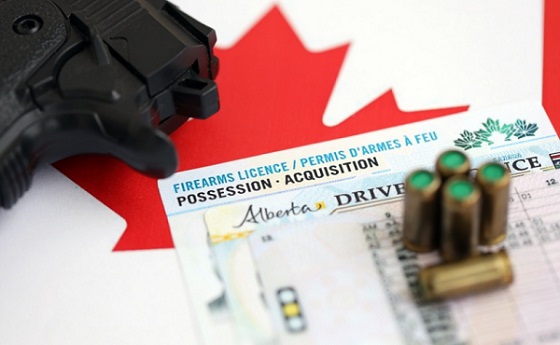Great Reset
Trudeau gov’t paid WEF nearly $500k for report justifying its climate agenda, documents show

From LifeSiteNews
The report, which cost taxpayers $493,937, was meant to make an economic case in favor of Trudeau’s environmental agenda, including his ever-increasing carbon tax.
Documents have revealed that Prime Minister Justin Trudeau’s government paid the World Economic Forum (WEF) to produce a report justifying its radical “climate change” policies, including the infamous carbon tax.
According to documents obtained by Conservative MP Leslyn Lewis through an Order Paper Question, Trudeau’s Environment and Climate Change (ECC) department’s then-minister, Catherine McKenna, commissioned the socialist WEF to produce a report supporting Trudeau’s environmental agenda in August 2019.
“Trudeau paid the WEF nearly $500K of Canadian taxpayer money for the New Nature Economy Report justifying his carbon tax,” Lewis wrote in a March 18 post on X, formerly known as Twitter.
“This was revealed through a question I submitted to the government,” she added. “Global interest groups should not be trusted to care about the prosperity of Canadians.”
Trudeau paid the WEF nearly $500K of Canadian taxpayer money for the New Nature Economy Report justifying his carbon tax. This was revealed through a question I submitted to the government. Global interest groups should not be trusted to care about the prosperity of Canadians. pic.twitter.com/dt4pBOdqwm
— Dr. Leslyn Lewis (@LeslynLewis) March 18, 2024
The report, which cost taxpayers $493,937, was meant to make an economic case for Trudeau’s environmental agenda, including his ever-increasing carbon tax.
According to the newly revealed documents, the ECC commissioned the report “to enable [the WEF] to produce and disseminate a report that will establish the business and economic case for safeguarding nature.”
“This report will be directed at senior decision makers in governments and businesses who have the influence and ability to shift business-as-usual approach,” it added.
The report, titled New Nature Economy Report Series, was published six months later, providing everything the Trudeau government had requested.
The WEF report recommended that “carbon pricing should also be introduced” as a way “to tackle rampant levels of deforestation and combat climate change simultaneously.”
“Ultimately, to make nature-positive models investable, explicitly pricing in and articulating environmental cost factors to penalize unsustainable practices – such as through carbon taxes, for example – will be a game changer,” it claimed.
The report further suggested that, “If 12 other countries rolled out a tropical carbon tax like those of Costa Rica and Colombia, together they could raise a total of $1.8 billion each year to invest in natural-climate solutions.”
The newly revealed documents come as Trudeau has refused to pause the carbon tax hike scheduled for April 1 despite appeals from seven of ten provincial premiers.
Trudeau’s carbon tax, framed as a way to reduce carbon emissions, has cost Canadian households hundreds of dollars annually despite rebates.
The increased costs are only expected to rise, as a recent report revealed that a carbon tax of more than $350 per tonne is needed to reach Trudeau’s net-zero goals by 2050.
Currently, Canadians living in provinces under the federal carbon pricing scheme pay $65 per tonne, but the Trudeau government has a goal of $170 per tonne by 2030.
The April 1 tax hike will increase the federal carbon tax to 17 cents per liter of gasoline, 21 cents per liter of diesel, and 15 cents per cubic meter of natural gas.
In addition to seven out of ten of Canada’s premiers opposing the tax hike, a recent survey found that 70 percent of Canadians likewise oppose Trudeau’s carbon tax increase.
However, despite appeals from politicians and Canadians alike, Trudeau remains determined to increase the carbon tax regardless of its effects on Canadians’ lives.
“My job is not to be popular – although it helps. My job is to do the right things for Canada. Now. And do the right things for Canadians,” he declared.
The Trudeau government’s current environmental goals – which are in lockstep with the United Nations’ 2030 Agenda for Sustainable Development – include phasing out coal-fired power plants, reducing fertilizer usage, and curbing natural gas use over the coming decades.
The reduction and eventual elimination of so-called “fossil fuels” and a transition to unreliable “green” energy has also been pushed by the World Economic Forum – the aforementioned group famous for its socialist “Great Reset” agenda – in which Trudeau and some of his cabinet are involved.
Censorship Industrial Complex
Frances Widdowson’s Arrest Should Alarm Every Canadian

Speech Crimes on Campus
Frances Widdowson, a former colleague professor at Mount Royal University, was arrested this past week on the University of Victoria campus. Her offence? Walking, conversing, and asking questions on a university campus. She was not carrying a megaphone, making threats, organizing a protest, or waving foreign flags. She was planning quietly to discuss, with whoever wished it, a widespread claim that has curiously evaded forensic scrutiny in Canada for five years: that the remains of 215 Indigenous children lie beneath the grounds of the former Kamloops Residential School.
UVic Campus security did not treat her as a scholar. Nor even as a citizen. They treated her as a contaminating source.
The director of security, a woman more reminiscent of a diversity consultant than a peace officer, almost shaking, presented Widdowson with papers and told her to vacate “the property.” When Widdowson questioned the order, citing her Charter rights and the university’s public nature, she was told to leave. She refused, and she was arrested. No force, no defiance, only a refusal to concede that inquiry is trespass.
Widdowson is no provocateur in the modern sense. She is not a shock-jock in a cardigan. She is a once-tenured academic with a long record of challenging orthodoxies in Indigenous policy, identity politics, and campus culture.
In 2008, she co-authored Disrobing the Aboriginal Industry, a book that deconstructed the bureaucratic machinery that profits from preserving Indigenous dependency. The book was methodical, sourced, and daring enough to be labelled heretical in some quarters, but simultaneously boringly Marxist materialistic.
Her arguments have made people uncomfortable for a long time. When I assigned her book to my political science students in the Department of Policy Studies, where Frances also taught, I was summoned by the department head’s office. Someone in my class complained about the book, though I ignored what was said, and the technocratic colleague, as chair of the department, had prepared a host of arguments to chastise me for assigning the book.
Widdowson was good enough to be hired as a colleague of that department, but they were all afraid of her ideas, and perhaps her manner. I have often wondered if the folks in the Mount Royal hiring committee had bothered to read her book. Hey, they had a female Marxist applying for a teaching job. Knowing how they operate makes me think they made giant assumptions about Frances.
My bureaucratic colleague relented. I got the impression that the department head was putting on a show, going through motions he didn’t want to engage in, but which he had to perform for administrative purposes. He had to act on the complaint, though the complaint had no substance. He tried to tell me that the ideas in the book might offend some students, and then went on with the typical dribble about being caring, but agreed that protecting feelings was not the objective of an education, nor the job of a professor.
Haultain’s Substack is a reader-supported publication.
To receive new posts and support our work, please consider becoming a free or paid subscriber.
Try it out.
I went to my campus office after the conversation with the department head, typed up a memo detailing our discussion, and emailed it to him to ensure there was a record of my viewpoint. The email got no response. He never mentioned it again, and to this day, 15 or 16 years later, we still haven’t spoken about it.
Some academic arguments are meant to shake things up. That is the purpose of scholarship: to stir the sediment of consensus. To challenge conventional views. Marxist or no, scholars are supposed to push the envelope. Expand the boundaries of our understanding. But in today’s academic culture, discomfort is treated as injury and dissent as violence. So, Widdowson was treated as a threat merely by walking and speaking.
Was the university within its legal rights to remove her? Possibly. Universities can invoke property rights, ironically in Cowichan territory, and provincial legislation sometimes grants them a curious status: publicly funded yet selectively private. But the question is not merely legal. It is cultural and constitutional.
The University of Victoria is a publicly funded institution, governed under provincial authority and subsidized by taxpayers. Its grounds, though some claim they are on unceded Indigenous territory, are functionally administered by the Crown. The university is not a monastery. While it is not a temple to be kept free of doubt, it is not a temple to be torched either. It is a civic institution. An institution of higher learning. When it uses its resources to shield ideology and expel dissenters, it forfeits its academic character.
Consider the contrast. On this same campus, as on many others across the country, protests have called for the destruction of Israel and the extermination of Jews. Banners are waved, slogans chanted, and genocidal euphemisms like “from the river to the sea” are uttered without hesitation. These demonstrations, some of which praise Hamas or glorify martyrdom, proceed unimpeded. Security stands down. The administration issues boilerplate statements about inclusion and respect.
But when a female academic arrives to ask whether the number “215” refers to actual remains or mere radar anomalies, she is marched off by police. The imbalance is not accidental. It is a product of institutional capture.
Contemporary universities have adopted a new moral vocabulary. Terms like “safety,” “inclusion,” and “harm” are now treated as constitutional categories. But their terms are undefined, fluid, shaped by ideology rather than principle. “Safety” no longer refers to bodily security, but has become an emotional preference. “Inclusion” does not mean openness to different ideas and people, but a validation of specific identities. “Harm” is not an act, but a feeling.
Under this logic, Widdowson’s presence becomes a form of injury. Her questions are recast as wounds. And because feelings have been elevated to rights, her removal becomes a public good.
This ideology has structure. It is not random. It rests on a model of revolutionary politics in which dissent must not be part of the conversation. A differing opinion is an obstacle to be cleared. The new inclusivity has become a form of exclusion. It uses the language of welcome to police belief, and the rhetoric of tolerance to enforce conformity.
Charter rights were once the guardrails of public life. They are not supposed to vanish down the rabbit holes when one steps onto that university lawn. The right to free expression, to peaceful assembly, and to enter public space are not conditional on popularity. They are not subject to the feelings of a security director or the preferences of a DEI office.
Widdowson is testing this principle. She did not resist arrest, nor did she make a spectacle of herself. She acted as a citizen asserting a constitutional right. The courts may eventually rule on whether her rights were infringed. But the deeper issue is already visible.
If our public institutions can exile peaceful critics while accommodating radical political agitators who cheer for foreign terror movements, we are not in a neutral society. We are in an elite-managed consensus.
This consensus is enforced by policy. It does not need debate. The consensus managers already know what is true and treat challenges as threats. In this environment, universities are no longer places where young minds wrestle with the pangs of uncertainty. They are enforcing temples of doctrine. Their priests wear lanyards. Their rituals involve land acknowledgments. Their blasphemies include asking inconvenient questions about graves that no one has bothered to exhume.
Frances Widdowson may not be universally admired. No one is. Her conclusions are sharp. Her manner is uncompromising. But that is precisely why her treatment should alarm us. The test of a free society is not how it treats the agreeable, but how it tolerates the disagreeable, to paraphrase Bernard Crick.
When universities lose the confidence to host dissent, they cease to be universities in any meaningful sense. They become echo chambers with fancy libraries. They educate students in the same way a treadmill provides runners with travel: motion without movement.
We are at a moment of reckoning for universities and for Canadian liberal democracy. When citizens cannot openly raise questions without fear of removal, the Charter becomes ornamental. If the test of allowable speech is whether it affirms prevailing narrative and myths, then neither truth nor inquiry has a place among us.
Widdowson’s arrest is not an isolated event. It is a signal that tells us who is welcome in the public square and who is not. It tells us that the basic right to question popular opinions is now conditional. And it affirms for us what we already know: that the guardians of inclusion are, in practice, the agents of exclusion.
No democracy can afford such arbiters. Certainly not one that still calls itself liberal.
Haultain’s Substack is a reader-supported publication.
To receive new posts and support our work, please consider becoming a free or paid subscriber.
Try it out.
DEI
AT&T ditches DE&I

AT&T’s retreat from the diversity, equity, and inclusion playbook marks one of the most significant corporate course corrections of the year — and it didn’t happen by accident. After months of pressure from FCC Chairman Brendan Carr, the telecom giant has confirmed it will unwind its DEI programs top to bottom, ending everything from race-based training modules to staff positions dedicated to enforcing ideological compliance.
The move follows years of controversy, much of it fueled by revelations that AT&T’s internal training materials pushed the notion that racism was a “uniquely white trait” and urged white employees to accept blame as part of a broader critical-race-theory framework. Those claims first surfaced in 2021 through documents obtained by researcher Christopher Rufo, who reported that the company’s curriculum told white staffers they “are the problem.” The backlash never fully subsided — and with Carr signaling that companies seeking key FCC licenses would need to demonstrate they are not running discriminatory programs, the pressure point became impossible for AT&T to ignore.
In a letter sent Monday to Carr, AT&T Senior Executive Vice President and General Counsel David McAtee said the company has overhauled its employment and business practices “to ensure compliance with all applicable laws,” emphasizing that the changes would be substantive, not cosmetic. According to AT&T, that means no hiring quotas, no supplier-contract quotas, no race-based training, and no positions devoted to policing identity-based metrics. DEI courses have been stripped from employee requirements, and the company says it will not resurrect them.
AT&T’s announcement mirrors what has become a growing trend in the corporate world as the regulatory environment shifts. In May, Verizon made a similar pledge, informing the FCC that it, too, would dissolve its DEI department and reassign staff to conventional HR roles. Carr praised that decision at the time as “a good step forward for equal opportunity, nondiscrimination, and the public interest.”
The broader message coming out of Washington is unmistakable: the days of federally regulated industries running ideological experiments under the guise of “equity” are coming to an end. Companies that want federal approval for major licenses are being told to stick to the law, treat employees equally, and drop programs that sort workers by skin color or political theory. AT&T is the latest to fall in line — and almost certainly not the last.
-

 National17 hours ago
National17 hours agoMedia bound to pay the price for selling their freedom to (selectively) offend
-

 Bruce Dowbiggin16 hours ago
Bruce Dowbiggin16 hours agoSometimes An Ingrate Nation Pt. 2: The Great One Makes His Choice
-

 Business5 hours ago
Business5 hours agoRecent price declines don’t solve Toronto’s housing affordability crisis
-

 Daily Caller6 hours ago
Daily Caller6 hours agoTech Mogul Gives $6 Billion To 25 Million Kids To Boost Trump Investment Accounts
-

 Business4 hours ago
Business4 hours agoOttawa’s gun ‘buyback’ program will cost billions—and for no good reason
-

 Energy2 days ago
Energy2 days agoELZABETH MAY HAS IT WRONG: An Alberta to Prince Rupert Oil Pipeline Will Contribute to Greater Global Oil Tanker Safety
-

 National2 days ago
National2 days agoAlberta will use provincial laws to stop Canadian gov’t from trying to confiscate legal firearms
-

 Energy7 hours ago
Energy7 hours agoThe Trickster Politics of the Tanker Ban are Hiding a Much Bigger Reckoning for B.C.





